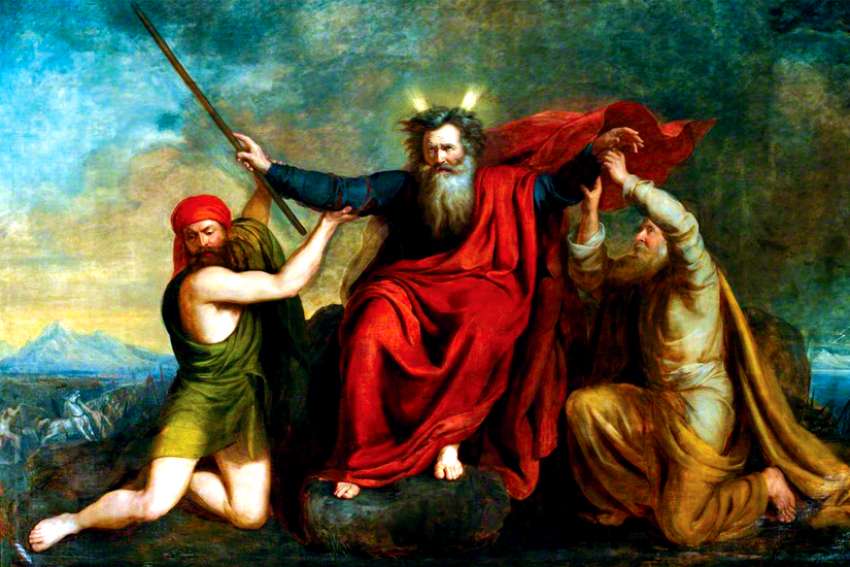The sight of a brave and fearless leader defying death on the battlefield can inspire exhausted troops to heroic action. The loss of a leader, on the other hand, often results in the disintegration of an army and disaster.
As Moses led the Israelites out to do battle with Amalek, he went to the top of the hill with his staff and a couple of his assistants. As long as he kept his arms extended, the Israelites prevailed over the enemy. But when his arms became tired and began to droop, his men began to be overwhelmed by the enemy.
Moses found a solution: He sat down and had his assistants hold up his arms so that the Israelites eventually prevailed over Amalek. Was there magic or power coming through the arms of Moses? Possibly, but there is a solution that is more likely and does not rely on supernatural help.
Moses was a good psychologist — he had to be to lead the unruly and rebellious people through the wilderness. He did not need access to a secret weapon, but he knew that if they believed that he was bestowing power from above on them they would be encouraged and fight harder.
The best leaders lead from the front and by example and that is exactly what he was doing. In our own time we desperately need good leaders — those who can inspire and give hope and courage.
Gestures and body language mean a lot. Most of the time we are unaware of this or we convey ambiguous or negative signals. How we walk, stand, speak or greet others are important.
Our bodies are effective communicators when we school ourselves in the art. Most of the time we needn’t say a word, something that St. Francis discovered long ago. As he sent his followers out to preach the Gospel, he said that sometimes they could even use speech — actions speak louder than words.
When the Second Letter to Timothy was written, most of the New Testament did not yet exist. The Scriptures referred to in the letter are what we call the Old Testament, and the point being made is that they are still valid.
“Old” does not mean outmoded or obsolete, but ancient and venerable. The letter is very clear about what Scripture is for. It is not a book of rules or doctrine, but tools for spiritual and moral formation.
It is far too easy to memorize huge chunks of the Bible but remain untouched and unchanged. Scripture only works when it is taken to heart and put into practice.
The image of the corrupt judge in the Gospel story was probably amusing to Jesus’ audience in a bittersweet sort of way. It was part of their everyday reality — corrupt judges, tax collectors and unjust managers.
Our judge was certainly corrupt. He cared neither for God nor his fellow human beings. The poor widow kept begging him for justice, but he remained unmoved.
But he had met his match — the widow would not give up and she eventually wore him down by her persistence. He gave in and rendered a judgment in her favour.
In the story, Jesus insists that we should pray just as the widow — with persistence to the point of irritation. It is not that God is like the corrupt judge or that we have to wear God down. The emphasis is on the persistence.
Half-hearted, anemic prayer — uttered without really expecting anything will happen — just will not do. Neither is praying about something once and then walking away from it. Our prayer is our hand reaching up to take the hand of God reaching down to us.
We have our part to play in this spiritual intensity that we call prayer. Prayer is a commitment and a mission rather than a duty.


